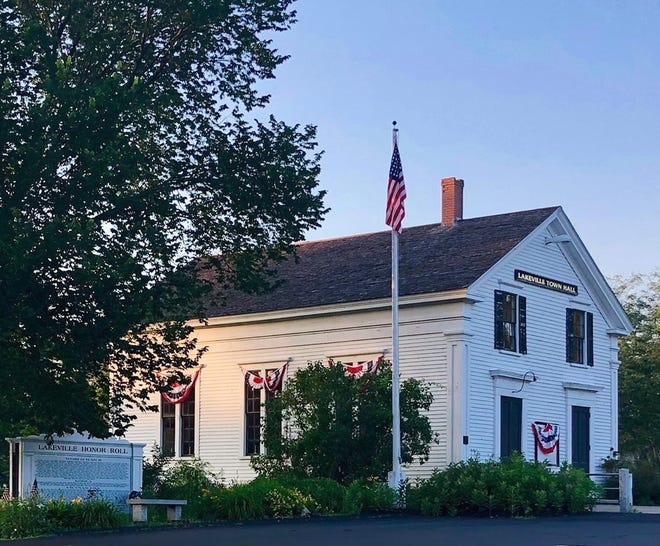Selectmen to consider options for federal stimulus money
Robert Barboza Correspondent
Published Apr 16, 2021

LAKEVILLE — Selectmen met virtually with their state legislators last week to get an update on the steady flow of federal pandemic relief and economic stimulus grant money being funneled to Massachusetts cities and towns.
In the first meeting after the annual town election, newly-elected Lorraine Carboni was welcomed to the board. During its annual reorganization session, the board named Lia Fabian as the new chair; member Richard LaCamera moved to vice chair for the next year.
The town received a$1.66 million allocation for pandemic related expenses under the CARES Act, the first federal relief bill passed last year. Much of that reimbursement money went to the school department, with the fire department adding two temporary firefighter/EMTs to help with the pandemic surge.
The regional school system also received some $254,000 in Elementary School Relief Act monies in the first round of CARES funding; and another $951,000 or so in the second round of ESRA allocations. If a third round of ESRA funding passes as proposed, the Freetown-Lakeville district could get $2.3 million in school assistance, State Senator Michael Rodrigues (D-Westport) told selectmen.
From the American Rescue Act passed in February, Lakeville was allocated $1.14 million in federal funds intended to create jobs, stimulate the economy, and provide some financial relief to cities and towns.
LaCamera was glad to hear that the money can also be used to replace “lost revenues” incurred by communities during the pandemic. He noted the town lost between $300,000 and $400,000 in local revenues during the economic downturn of the past year.
More economic stimulus money is coming down the road, too, in the new federal economic aid bill currently being debated in Congress, Rodrigues noted. Every town in his district is being encouraged to review its capital needs, and prepare detailed plans for big projects that would qualify for the federal funding, he said.
Capital needs projects such as new schools, fire stations, affordable housing, or other municipal buildings need to be quickly planned, designed, and readied for public bidding, so as to be “shovel-ready” to go when the new federal funds become available, Rodrigues suggested. The federal and state governments will want the aid money distributed quickly to help jump start the economy, he explained.
“Whoever’s ready to go will likely get the money... whoever’s ready to bid, or shovel ready,” he told the board. “Get it designed, planned, and ready to bid. Now is the time.”
When the legislator heard some details on the town’s plans to use a $100,000 earmark in the state bond bill to fund expansion of the municipal fiber optic network to more town buildings, he suggested that perhaps some federal aid money might be used to expand the network to all town buildings.
The state administration will support sound proposals ready for bidding that will boost business and industry, create jobs, and fulfill public needs, Rodrigues said. “Governor Baker always looks at the data – it’s a matter of how many jobs is this project going to create,” he said of recent state funding priorities.
Though the state budget remains unsettled, the Senate Ways & Means Committee chair indicated he expects a 3.5 percent increase in unrestricted state aid this year. A small increase in Ch. 70 education aid is also expected to pass both houses of the legislature, he predicted.
A separate transportation bill contains $2.5 million for traffic lights and intersection improvements at the Bridge Street intersection, he confirmed. He has also identified $1 million in unspent funds from a 2018 transportation bond that could be used for improvements “around the Lakeville Hospital property.”
The state “cannot spend any money on private property... It can only be used for improvements to public property, for infrastructure like water or sewer lines, or roadway improvements,” Rodrigues said of the unspent bond money.
Selectmen noted that the state is funding a study of the Route 18 and Route 105 intersection to initiate a redesign and improvement project; state money is funding the upcoming repaving of the southbound lane of Route 105.
On the legislative front, the state senator noted that the town’s home rule petition, authorizing the change of the Town Treasurer position from elected to appointed, has passed both houses.
State Representative Norman Orrall was also on hand for the virtual meeting, and he noted that the pending federal economic development bill will also contain funding for low income housing tax credits, an encouragement to developers of affordable housing. The passage of legislation encouraging the construction of high density multi-family rental housing developments within a half mile of MBTA stations may also have an impact on Lakeville, he suggested.
Orrall said that half-mile circle will be drawn from the current train station on the Lakeville side of the town line, not the future MBTA station on the Middleborough side of the line.
Rodrigues added that “right now, the Governor’s priority is to create new affordable housing,” especially rental units. Planning Board member Barbara Mancovsky, the board’s delegate to the Master Plan Implementation Committee (MPIC), suggested that the town needs more affordable home ownership opportunities, not just more affordable rental units.
MPIC Chair Rodney Dixon expressed hopes that the state administration would not promote more high-density apartments around the Lakeville station, feeling that move might not be supportive of the master plan’s goals for that part of town.

No comments:
Post a Comment
Note: Only a member of this blog may post a comment.